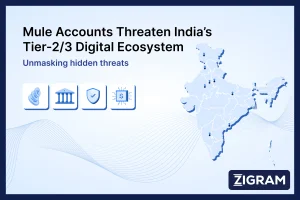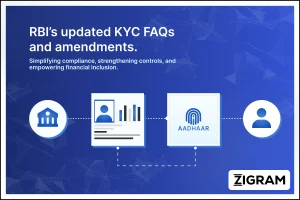The fintech industry is revolutionizing financial services through innovations like mobile banking, digital wallets, blockchain, and peer-to-peer lending. However, this rapid growth also brings significant AML challenges. As fintech companies expand, navigating AML regulations becomes essential to prevent financial crimes and ensure system stability. Global and national regulators, including FATF, FinCEN, FCA, and AUSTRAC, set standards for compliance, requiring measures such as customer due diligence and transaction monitoring. Navigating these evolving AML requirements is crucial for fintech firms to prevent financial crimes and maintain trust in the financial system.

Get updates about the regulatory world instantly! Follow us on LinkedIn
What Is The Need For AML Regulations?
1. Prevention Of Financial Crimes
Fintech companies are increasingly being used as channels for money laundering, terrorist financing, and other financial crimes due to their innovative and often less-regulated platforms. AML regulations are crucial in preventing these crimes by ensuring that fintech firms implement strong measures to detect and report suspicious activities.
2. Maintaining Trust And Integrity
The financial system's trust and integrity are foundational to its stability. Without robust AML regulations, fintech platforms risk becoming avenues for illegal activities, which could undermine public confidence in both the fintech industry and the broader financial system.
3. Compliance With International Standards
Fintech companies operating across borders must comply with international AML standards set by organizations such as the Financial Action Task Force (FATF). These regulations help create a level playing field, ensuring that fintech firms adhere to global best practices in combating money laundering and financing of terrorism.
4. Risk Management
Fintech companies often deal with vast amounts of data and transactions, making them vulnerable to exploitation by criminals. AML regulations require these companies to implement comprehensive risk management strategies, including customer due diligence (CDD), transaction monitoring, and reporting mechanisms, to mitigate the risks of being used for illegal purposes.
5. Legal And Financial Repercussions
Non-compliance with AML regulations can lead to severe legal and financial penalties, including fines, sanctions, and reputational damage. For fintech companies, adhering to AML regulations is not only a legal obligation but also a critical component of risk management that helps avoid costly repercussions.
Looking for the best RegTech solution? Book a FREE DEMO with us now!
What Are The Current Global AML Regulatory Trends?
As the fintech industry continues to evolve, regulatory bodies across the globe are adapting their frameworks to address the unique challenges posed by new technologies and financial innovations. In 2024, several key trends have emerged in the realm of Anti-Money Laundering (AML) regulations, reflecting a global commitment to combat financial crime while fostering innovation in the fintech space. Here’s a closer look at how leading countries are shaping their AML regulatory landscapes
 United States of America
United States of America
- Enhanced AML Compliance For Virtual Asset Service Providers (VASPs)
The U.S. Department of the Treasury, through the Financial Crimes Enforcement Network (FinCEN), has intensified its focus on Virtual Asset Service Providers (VASPs). FinCEN is pushing for stricter compliance with AML and Counter-Terrorism Financing (CTF) obligations, particularly in customer due diligence (CDD), transaction reporting, and monitoring cross-border digital asset transactions. This initiative is part of a broader strategy to address the gaps in AML coverage within the rapidly expanding cryptocurrency sector.
- Proliferation Of AML Act 2020 Measures
The AML Act 2020 continues to play a pivotal role in the U.S. regulatory environment. Notably, the Corporate Transparency Act (CTA) under this act mandates companies to disclose beneficial ownership information, a move aimed at curbing the misuse of shell companies for money laundering. Fintech companies must navigate these stringent requirements to avoid significant penalties.
- Strengthened Oversight Of Non-Bank Financial Institutions (NBFIs)
AML obligations are increasingly extending to non-bank financial institutions, including fintech firms. The U.S. government is ensuring these entities adhere to the same standards as traditional banks, which includes implementing advanced monitoring systems to detect suspicious transactions and enhancing transparency in financial operations.
- Cryptocurrency Regulation
The Securities and Exchange Commission (SEC) and the Commodity Futures Trading Commission (CFTC) have ramped up their scrutiny of the cryptocurrency markets. Their efforts focus on mitigating fraud, market manipulation, and ensuring compliance with existing financial regulations. This heightened oversight reflects the broader U.S. strategy to secure the evolving cryptocurrency landscape.
- Data Privacy and Protection
With updates to the California Consumer Privacy Act (CCPA), the U.S. is reinforcing data protection for consumers. These updates impose stricter requirements on how businesses, particularly those in fintech, handle personal data, ensuring responsible management and robust security measures.
 European Union
European Union
- Sixth Anti-Money Laundering Directive (6AMLD)
6AMLD introduces tougher penalties and broader definitions of money laundering offenses, requiring fintech companies to adopt stricter compliance measures. It also emphasizes the role of criminal liability for legal entities involved in money laundering activities.
- Creation Of A European AML Authority (AMLA)
The European Union is establishing a centralized AML Authority (AMLA) to oversee high-risk financial institutions and coordinate national regulators' activities. For fintech companies, this development implies a more standardized and stringent regulatory environment across Europe, necessitating robust compliance mechanisms to manage risks effectively.
- AML Provisions In The Markets In Crypto-Assets (MiCA) Regulation
MiCA regulations are set to incorporate comprehensive AML provisions for digital assets. Fintech companies dealing with crypto-assets will need to adhere to stringent standards, including enhanced CDD and transaction monitoring, to combat money laundering and terrorist financing effectively.
- Enhanced Customer Due Diligence (CDD) Requirements
The EU is intensifying CDD requirements, particularly for fintech companies engaged with high-risk third countries. These firms must implement rigorous checks on customers from jurisdictions with weak AML/CFT controls to ensure compliance.
 United Kingdom
United Kingdom
- Post-Brexit AML Framework Adjustments
The UK is refining its AML regulatory framework post-Brexit to align more closely with its own financial priorities while still meeting global standards. The Financial Conduct Authority (FCA) is placing a strong emphasis on monitoring fintech companies, particularly those dealing with digital assets, to ensure they adhere to robust AML controls. This includes requiring firms to register with the FCA under the Money Laundering Regulations and undergo regular audits to assess compliance.
- Expansion Of The Financial Crime Levy
The UK government has introduced the Financial Crime Levy, which applies to all regulated entities, including fintech companies. This levy is intended to raise funds to support the fight against economic crime, particularly money laundering. Fintech firms are required to contribute based on their size and risk profile, adding another layer of financial responsibility to their compliance obligations.
- Greater Focus On AML In Regulatory Sandboxes
The FCA's regulatory sandboxes are increasingly focusing on ensuring that fintech innovations do not compromise AML standards. Companies participating in these sandboxes are expected to demonstrate robust AML controls before being allowed to scale their operations. This ensures that new fintech products are secure and compliant from inception.
- Revised AML Guidelines For Crypto Assets
The UK’s Financial Conduct Authority (FCA) is enhancing AML regulations for crypto assets, requiring fintech firms to implement stronger controls, including real-time monitoring and robust KYC procedures for crypto transactions.
- Economic Crime (Transparency And Enforcement) Act 2022
This act introduces new measures to tackle money laundering, including stricter rules around the disclosure of overseas entities owning UK property. Fintech firms dealing in real estate must comply with these enhanced transparency requirements.
- Updates To The Proceeds of Crime Act (POCA)
Recent updates to the UK's Proceeds of Crime Act (POCA) enhance authorities' abilities to combat financial crime by expanding unexplained wealth orders and allowing the seizure of criminal assets, including cryptocurrencies. These changes also strengthen reporting requirements for suspicious activities and promote greater international cooperation in recovering illicit funds.
 Singapore
Singapore
- Refinement Of AML Regulations For Digital Payment Tokens
The Monetary Authority of Singapore (MAS) continues to enhance its AML/CFT regulations, particularly concerning digital payment tokens. Fintech companies offering these services must adhere to rigorous AML measures, including the verification of customer identities, ongoing transaction monitoring, and reporting suspicious activities. The MAS also emphasizes the importance of fintech firms integrating advanced technology solutions to effectively manage AML risks.
- Stricter AML Standards For Fintech Startups In Regulatory Sandboxes
While Singapore encourages innovation through its regulatory sandbox, the MAS mandates that fintech startups meet stringent AML requirements even during the testing phase. This ensures that as these companies develop and scale, they are fully equipped to manage AML risks, making them more resilient against financial crime from the outset.
- Cross-Border AML/CFT Collaboration
Singapore is strengthening its AML/CFT framework through collaborations with international regulatory bodies. Fintech companies operating in multiple jurisdictions must ensure their compliance programs align with both local and international standards.
- Expanded AML/CFT Coverage For Fintech
MAS is broadening the scope of its AML/CFT regulations to include new types of fintech services, such as decentralized finance (DeFi) platforms, which must now adhere to stringent AML/CFT controls.
 Australia
Australia
- AML/CTF Rule Updates
The Australian Transaction Reports and Analysis Centre (AUSTRAC) regularly updates its AML/CTF rules to address emerging financial crime risks. Fintech companies must stay informed of these changes to ensure compliance, particularly in digital currency exchange and remittance services.
- Strengthened Penalties For Non-Compliance
AUSTRAC has increased penalties for non-compliance with AML/CTF regulations, imposing substantial fines and enforcement actions against fintech firms that fail to meet their obligations.
- Focus On High-Risk Sectors
AUSTRAC is focusing on high-risk sectors like digital wallets and cross-border transactions. Fintech companies in these areas must implement advanced AML/CTF controls to mitigate associated risks, ensuring their operations meet stringent regulatory standards.
 India
India
- AML Requirements For Fintech Firms Amid New Digital Initiatives
The Reserve Bank of India (RBI) is reinforcing AML compliance, particularly for fintech companies in digital payments and cryptocurrency. Enhanced KYC requirements and stringent customer due diligence measures are part of the RBI's broader effort to safeguard India's digital economy from money laundering risks.
- Integration Of AML Controls Into Unified Payments Interface (UPI) Expansion
As UPI continues to grow, the RBI is embedding enhanced AML controls into the platform, requiring fintech firms to implement advanced monitoring systems to detect and prevent money laundering activities.
- Cross-Border Transactions Oversight
The RBI is increasing scrutiny of cross-border fintech transactions, requiring firms to have robust AML/CFT controls in place to detect and report suspicious activities, ensuring compliance with international standards.
Want to know more about regulations? Contact us NOW!
Achieving Regulatory Compliance With ZIGRAM
At ZIGRAM, we understand that the regulatory landscape for fintech companies is continuously evolving to address the challenges at the intersection of finance and technology. Our expertise in AML, risk screening, and compliance solutions helps fintech firms navigate these complexities with confidence. By staying abreast of global trends and regional specifics, we provide the tools and insights necessary for balancing innovation with robust compliance. With ZIGRAM’s support, fintech companies can ensure they remain compliant while driving growth and innovation within a secure and efficient financial ecosystem.
Accelerate your growth through innovation!! Sign up for our FREE DEMO for the best RegTech solutions.
- #AML
- #RegulatoryTrends
- #Compliance
- #FinancialCrime
- #RisksChecks






